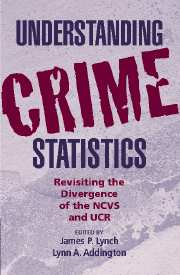Book contents
- Frontmatter
- Contents
- Acknowledgments
- Contributor Biographies
- INTRODUCTION
- OVERVIEW OF THE TWO NATIONAL MEASURES OF U.S. CRIME
- DEFINING DIVERGENCE AND CONVERGENCE
- SOURCES OF DIVERGENCE IN THE NCVS
- SOURCES OF DIVERGENCE IN THE UCR
- CONCLUSION
- 11 Conclusion
- Index
- CAMBRIDGE STUDIES IN CRIMINOLOGY
- References
11 - Conclusion
Published online by Cambridge University Press: 23 December 2009
- Frontmatter
- Contents
- Acknowledgments
- Contributor Biographies
- INTRODUCTION
- OVERVIEW OF THE TWO NATIONAL MEASURES OF U.S. CRIME
- DEFINING DIVERGENCE AND CONVERGENCE
- SOURCES OF DIVERGENCE IN THE NCVS
- SOURCES OF DIVERGENCE IN THE UCR
- CONCLUSION
- 11 Conclusion
- Index
- CAMBRIDGE STUDIES IN CRIMINOLOGY
- References
Summary
One goal of Understanding Crime Statistics is to encourage and facilitate the appropriate use of crime statistics through a discussion of the divergence of the Uniform Crime Reports (UCR) and the National Crime Victimization Survey (NCVS). We also seek to build on the idea of complementarity, which originated from the work of Biderman and Lynch (1991). Specifically, Biderman and Lynch's work makes two important points concerning crime statistics. One is that all statistical systems will distort to some degree the data produced and the important lesson for researchers is to understand how this occurs so that appropriate adjustments can be made. The second point is that it is virtually impossible to get statistical systems that are organized as differently as the NCVS and the UCR to tell the same story across the board. Given these two points, Biderman and Lynch concluded that energy and resources were better invested in discovering ways to use these data systems in complementary rather than competing ways.
Although the principle of complementarity seems to be widely accepted today, this acceptance may be fickle. Complementarity has not received a real test because of the coincidence that the two series have tracked reasonably well for more than a decade. When the two series diverge, and history tells us that they will, ready explanations for this divergence must be available as well as examples of very specific ways in which the two systems (even in a divergent state) can be used jointly to shed new light on the crime problem.
- Type
- Chapter
- Information
- Understanding Crime StatisticsRevisiting the Divergence of the NCVS and the UCR, pp. 297 - 334Publisher: Cambridge University PressPrint publication year: 2006

